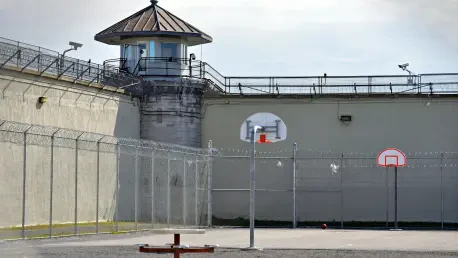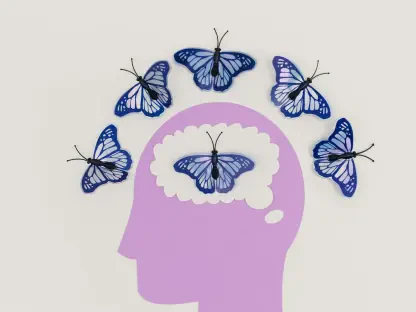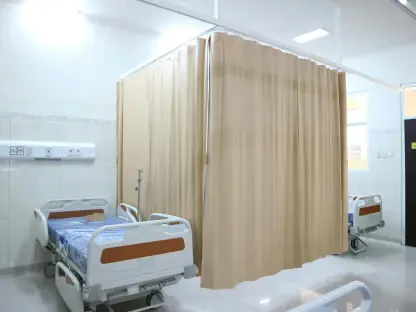The situation for immigrants held in U.S. detention centers has emerged as a critical humanitarian issue, particularly under the current intensified immigration enforcement policies that have dramatically increased the number of detentions. As of September this year, nearly 60,000 individuals are confined in Immigration and Customs Enforcement (ICE) facilities, a staggering jump from previous figures, placing immense pressure on infrastructure and resources. This surge, driven by a shift toward mass deportation targeting all undocumented immigrants, has exposed deep flaws in the system, from inadequate health care to deplorable living conditions. Reports of illness, mental health crises, and even deaths among detainees paint a troubling picture of neglect and systemic failure. Beyond the walls of these centers, the ripple effects harm entire communities, impacting access to medical services and economic stability. This article delves into the multifaceted health risks faced by detained immigrants, exploring the immediate dangers within facilities and the broader societal consequences of such policies. By examining the intersection of enforcement practices and human well-being, a clearer understanding emerges of the urgent challenges that must be addressed to protect vulnerable populations caught in this complex web of immigration control.
Unmet Medical Needs in Detention Facilities
The provision of health care within ICE detention centers stands out as a glaring deficiency, with numerous accounts highlighting a failure to meet even basic standards. Despite established guidelines mandating initial health screenings, round-the-clock emergency care, and comprehensive medical services, the reality often falls short. Reports from oversight bodies have documented instances where detainees’ medical needs are ignored, leading to preventable suffering and, in some cases, fatal outcomes. Essential treatments are delayed or denied, and there have been alarming cases of unauthorized medical procedures performed without proper consent. This systemic neglect disproportionately affects those with chronic conditions or acute illnesses, leaving them vulnerable to rapid deterioration in an environment ill-equipped to respond. The gap between policy and practice raises serious ethical questions about the treatment of individuals under government custody, especially when the consequences can be life-threatening.
Particular attention must be paid to how these health care failures impact specific demographics within detention centers, revealing an even deeper level of concern. Vulnerable populations, such as pregnant individuals, face inadequate prenatal care, often resulting in complications that could be avoided with proper attention. Children detained in these facilities suffer from a lack of pediatric services, while LGBT individuals encounter additional barriers, including insufficient mental health support amidst reported harassment. The absence of tailored medical interventions for these groups exacerbates existing risks, contributing to a cycle of declining health. Tragically, the record of 15 deaths in detention this year alone underscores the lethal potential of such shortcomings. Addressing these disparities requires not just adherence to existing standards but a fundamental reevaluation of how medical care is prioritized and delivered in these high-stakes settings.
Harsh Environments and Physical Health Threats
Living conditions in many ICE facilities present severe threats to detainees’ physical health, often compounding the challenges posed by inadequate medical care. Overcrowding has become a pervasive issue, with numerous centers operating well beyond their intended capacity due to the rapid increase in arrests. This strain results in poor sanitation, limited access to nutritious food, and exposure to extreme temperatures, all of which directly contribute to illness. Detainees have reported outbreaks of foodborne diseases and respiratory issues linked to insufficient ventilation, while others endure harsh cold or heat without adequate protection. These environmental hazards create a breeding ground for health problems, undermining the basic human right to safe and humane treatment. The physical toll of such conditions is evident in the rising incidence of preventable ailments among those confined.
Further compounding these risks is the unconventional use of non-standard locations for detention, which often escape regular scrutiny. Hotels and military bases have been repurposed to house immigrants, yet many lack the infrastructure to meet basic health and safety requirements. Reports detail instances of severe overcrowding in temporary facilities, alongside shortages of essential supplies like clean water and bedding. Such environments not only heighten the risk of physical illness but also erode any sense of dignity for those detained. The connection between these substandard conditions and adverse health outcomes cannot be overstated, as the body’s ability to withstand stress and disease diminishes under constant duress. Without significant improvements to facility standards and capacity management, these physical health threats will continue to endanger lives.
Psychological Strain and Mental Health Crises
Detention takes a profound toll on mental health, with the psychological strain of confinement often proving as debilitating as physical ailments. The uncertainty of prolonged detention, coupled with the trauma of family separations, creates a pervasive sense of fear and hopelessness among detainees. Many experience heightened levels of anxiety, depression, and post-traumatic stress disorder (PTSD), conditions that are frequently left unaddressed due to limited access to mental health resources. The use of solitary confinement as a disciplinary measure only deepens this crisis, intensifying feelings of isolation and despair. Over the past decade, the suicide rate within these facilities has climbed, serving as a stark indicator of the emotional burden carried by those held in custody.
Beyond individual experiences, the broader context of detention policies amplifies mental health challenges through systemic stressors. The constant threat of deportation looms large, adding a layer of psychological distress that permeates daily life in detention. For parents separated from children, the anguish of not knowing their family’s fate can lead to long-term emotional scarring. Even when mental health services are available, cultural and linguistic barriers often prevent effective intervention, leaving many to suffer in silence. This widespread neglect of psychological well-being reflects a critical gap in the care provided, as mental health is integral to overall health. Until detention practices account for these invisible wounds, the full scope of harm inflicted on detainees will remain inadequately addressed.
Unique Dangers for At-Risk Groups
Certain segments of the detained population face distinct health risks that demand targeted attention and intervention. Children in detention centers often endure conditions that disrupt their physical and emotional development, with limited access to age-appropriate care or education compounding the harm. Pregnant individuals frequently lack essential prenatal support, increasing the likelihood of adverse outcomes for both mother and child. These gaps in care reveal a troubling disregard for the specific needs of younger and expectant detainees, whose well-being hinges on specialized services that are rarely provided. The long-term consequences of such neglect can extend far beyond the duration of detention, affecting future generations.
Equally concerning are the heightened risks faced by LGBT detainees, who report elevated instances of harassment and abuse within facilities. This hostile environment exacerbates mental health struggles, as discrimination and violence create a pervasive sense of insecurity. Physical health is also jeopardized when fear of mistreatment deters individuals from seeking necessary medical attention. The intersection of identity and detention status thus amplifies vulnerability, underscoring the need for policies that protect against bias and ensure equitable treatment. Without dedicated measures to safeguard these at-risk groups, the health disparities within detention centers will persist, perpetuating a cycle of harm that undermines basic human rights.
Community-Wide Health and Social Impacts
The health risks associated with detention extend well beyond the confines of ICE facilities, profoundly affecting immigrant communities at large. Fear of enforcement actions has led many to avoid seeking medical care or enrolling in public assistance programs, resulting in untreated conditions and worsening health outcomes. This reluctance stems from widespread confusion and concern over how accessing services might impact immigration status, creating a chilling effect on essential care. Consequently, preventable illnesses go unchecked, and chronic conditions deteriorate, placing additional strain on families already grappling with the stress of potential detention or deportation. The broader public health implications of such avoidance are significant, as delayed treatment can lead to larger outbreaks or community-wide health declines.
Moreover, the impact on families, particularly U.S.-born children of immigrants, reveals a deeper layer of societal harm. Research indicates that children in areas targeted by enforcement raids experience declining educational performance and increased mental health issues, driven by the trauma of family separation or the fear of losing a parent. Hispanic mothers have shown poorer birth outcomes linked to stress from immigration policies, highlighting how health consequences ripple through generations. These community-wide effects demonstrate that detention policies do not merely affect those held in custody but reshape the well-being of entire populations. Addressing these far-reaching impacts requires a holistic approach that considers both the immediate needs of detainees and the long-term health of interconnected communities.
Enforcement Policies and Accountability Gaps
Current immigration enforcement strategies have intensified the health crises within detention centers, often prioritizing deportation over humane treatment. The dramatic rise in detentions, fueled by policies targeting all undocumented immigrants regardless of criminal history, has overwhelmed facilities and strained resources. Significant federal funding, including allocations to the Department of Homeland Security, has expanded detention capacity but failed to ensure corresponding improvements in care or conditions. Legal challenges to these policies persist, creating uncertainty about their sustainability, yet the immediate impact on detainee health remains undeniable. The focus on mass enforcement appears to sideline critical considerations of well-being, amplifying risks for those in custody.
A parallel concern lies in the reduction of oversight mechanisms, which has diminished accountability for the treatment of detainees. The closure of key watchdog agencies within the Department of Homeland Security has limited the ability to monitor and address violations of health and safety standards. Efforts to weaken protections, such as those for detained minors, have faced court opposition, but the push for indefinite family detention raises alarms about potential future abuses. Without transparent reporting or robust independent review, the true extent of health risks in detention centers remains obscured. Restoring rigorous oversight is essential to ensure that policy implementation aligns with ethical standards and prioritizes the health of vulnerable populations.
Economic and Societal Fallout from Mass Detention
The consequences of mass detention policies ripple through the economy, disrupting industries that rely heavily on immigrant labor. Since the start of this year, over 1 million immigrants have left the workforce, either through detention or voluntary departure driven by fear of enforcement. Sectors like health care, agriculture, and construction face acute labor shortages, leading to operational challenges and economic losses. These disruptions highlight the interconnectedness of immigration policy and national productivity, as the absence of workers undermines critical services and supply chains. The broader societal cost of such policies becomes evident when essential roles go unfilled, affecting communities far removed from detention centers.
Additionally, the societal fabric is strained by the human toll of these policies, as families and communities bear the burden of separation and loss. Mixed-status households often face severe financial hardship when a primary earner is detained, pushing remaining family members into precarious situations. The resulting instability contributes to broader social issues, including increased poverty and reduced community cohesion. These cascading effects underscore that the health risks tied to detention are not isolated incidents but part of a larger web of consequences that touch every corner of society. Tackling this fallout demands a balanced perspective that weighs enforcement goals against the profound human and economic costs they incur.
Path Forward for Health and Humanity
Reflecting on the myriad health risks faced by immigrants in detention centers, it becomes evident that systemic failures have exacted a heavy toll on physical and mental well-being. The alarming rate of preventable deaths, alongside widespread reports of inadequate care and harsh conditions, paints a grim reality for those held in ICE facilities. Beyond individual suffering, entire communities have borne the brunt of fear-driven health declines and economic disruptions, revealing the deep interconnections between policy and societal health. Each layer of this crisis—from medical neglect to accountability gaps—has compounded the challenges, leaving vulnerable populations in a state of heightened risk.
Looking ahead, actionable steps must prioritize comprehensive reform to safeguard detainee health and dignity. Strengthening oversight through reinstated watchdog mechanisms could ensure adherence to health and safety standards, while increased transparency in reporting would shed light on persistent issues. Investment in facility infrastructure and medical resources stands as a critical need to alleviate overcrowding and care deficiencies. Furthermore, policies should shift toward community-based alternatives to detention, reducing reliance on confinement and mitigating broader societal impacts. By addressing these challenges with urgency and compassion, a framework can emerge that balances immigration enforcement with the fundamental imperative to protect human life and well-being.









